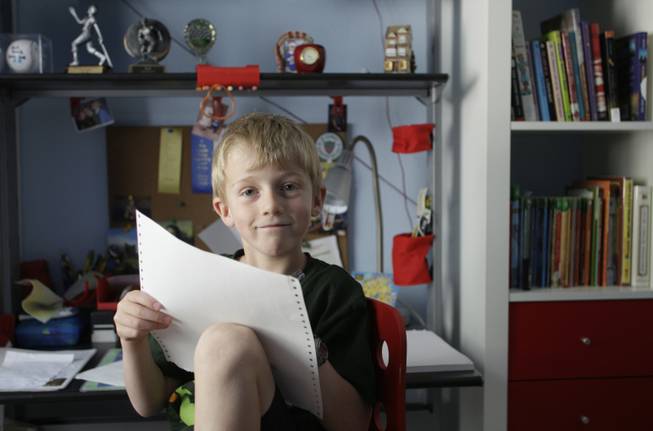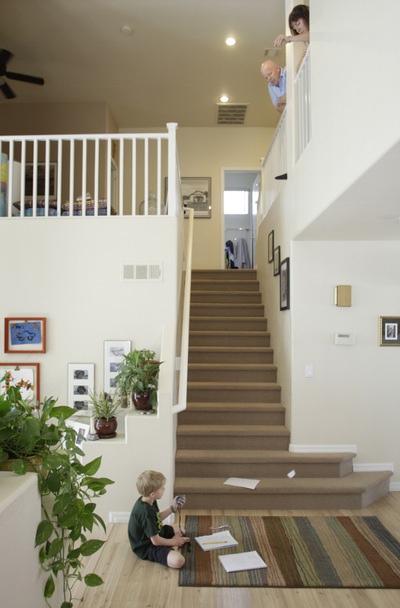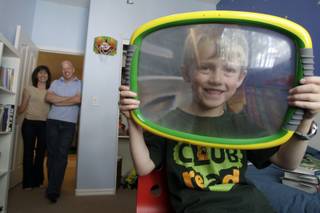
Asa Zink, 6, poses in his bedroom Thursday, May 13, 2010. Asa is being homeschooled because he is profoundly gifted, and the Clark County School District doesn’t offer a program to meet his needs. Plans for a stand-alone academy for gifted students have been tabled due to the budget crisis.
Tuesday, May 18, 2010 | 2 a.m.
Sun archives
Beyond the Sun
For families of the valley’s smartest children, the news back in December was welcomed: A $600,000 federal appropriation would help the Clark County School District pursue plans to start a stand-alone, $2.5 million academy for highly gifted students.
The academy would go a long way in providing the kind of special attention that highly gifted students lack, in part because of federal initiatives that force public schools to focus mostly on students at the opposite end of the achievement spectrum.
But with the district cutting $145 million from next year’s budget, and the outlook even more grim for the next biennium, plans for the academy are cooling on the back burner.
The $600,000 appropriation to Clark County was the largest of its kind in the country, said Jane Clarenbach, director of the National Association for Gifted Children in Washington, D.C.
“There was a lot of excitement about that investment in bright kids — people are watching what’s happening in Clark County,” Clarenbach said. “It’s disappointing that the money still wasn’t enough for the academy to get going more quickly.”
Education experts say the district’s existing programs for gifted education, while better than what’s offered in much of the country, can’t replicate the potential benefits of a dedicated campus tailored specifically to the most advanced students’ needs.
The academy would serve students in grades 6 through 12 who have an IQ of at least 145, representing the top 0.1 percent of the population. The district has identified about 180 students who would qualify.
The proposed academy would have been the first district program to gather gifted students as a group, as opposed to receiving limited services at their neighborhood schools.
Nevada, like more than a quarter of the states, provides no funding to support gifted education, leaving it up to individual districts to set their priorities.
The Clark County School District pays for its program, called Gifted and Talented Education, or GATE, from its regular budget, at a cost of $8 million for the 2010-11 academic year. The program was protected from budget cuts.
The district has five years to spend the $600,000 appropriation. Some of those dollars will be used in the 2010-11 academic year to expand programs for highly gifted students, said Kristine Minnich, district GATE coordinator.
She noted that the district makes a special effort to place highly gifted students in appropriate classes and offer outside enrichment opportunities.
Students in grades 3 through 5 who are identified as gifted — there are more than 5,500 of them this year — receive 2.5 hours per week of specialized instruction at their neighborhood schools. Gifted students who want to study at their own pace can enroll in the district’s virtual high school as well as the Academy of Individualized Study. Several charter schools also offer online learning programs tailored to gifted students.
That’s better than most districts are able to offer, Clarenbach said.
The virtual high school and individualized study programs are indicative of the district’s innovative thinking, she said, and it’s also good news that the programs weren’t sacrificed during the budget crisis.
“Clark County ought to be patted on the back for making a broad effort” in nurturing the brightest students," Clarenbach said. “The more gifted you are, the more challenging it is for the school district to find something that works for you.”
There is hard evidence that gifted students haven’t fared well since No Child Left Behind took effect in 2002.
One of the sharpest criticisms of the federal law is that it forces school districts to dedicate a disproportionate amount of resources to struggling students to avoid the stigma of having a school labeled as “needing improvement,” while offering districts few incentives to boost performance among students who already are high achievers.
Since 1999, low achievers have made steady gains on the National Assessment of Educational Progress, often called “the Nation’s Report Card.” But scores for students in the top 10 percent have remained essentially flat.
With the federal education law up for reauthorization, Clarenbach said there have been encouraging discussions with lawmakers and “general agreement” that gifted education needs to be boosted, particularly identifying and supporting students from low-income households who tend to slip past the radar.
The benefits of a stand-alone academy, versus the typical “pullout” programs are myriad, Clarenbach said. Gifted students often face social and emotional challenges as a result of their abilities, and the academy setting would make it easier to address those issues.
Research shows that 20 percent of students who drop out of high school nationwide tested in the gifted range, and nearly 90 percent of those students were earning passing grades when they left school. The students told researchers that a more challenging curriculum would have kept them engaged and interested.

Asa Zink, 6, conducts a velocity experiment with the help of his parents Bryan and Marcia, above, at his home Thursday, May 13, 2010. Asa is being homeschooled because he is profoundly gifted, and the Clark County School District doesn't offer a program to meet his needs. Plans for a stand-alone academy for gifted students have been tabled due to the budget crisis.
The public and charter school options didn’t provide enough flexibility for Marcia Zink, who is home-schooling her gifted 6-year-old son, Asa.
Asa is working about three years ahead of his age level in the core subjects, and tackling seventh-grade math. He is also an avid reader, saying he purposely took his time reading the final, 700-page installment of “Harry Potter” because he wanted to savor the last of the series.
Zink and Asa meet several days each week with other families home-schooling their children, and the parents take turns providing lessons in their particular areas of expertise. She’s comfortable with continuing home schooling for the next few years, but worries whether her son’s abilities would benefit by a more specialized setting.
One option for the family — although it would require relocation — is the Davidson Academy in Reno, a university school for profoundly gifted students, defined as having an IQ of at least 145 or 150, depending on the test used. A public school funded by the state in addition to private donations, the Davidson Academy’s students are not charged tuition, and many supplement their learning with classes at UNR.
Bryan Zink, an officer with the Clark County School District Police, said he hopes the district’s academy will come to reality within a few years, so his family can stay in Las Vegas.
In the meantime, Asa has qualified for the “Young Scholars” outreach program through the Davidson Institute for Talent Development, a private nonprofit organization which supports the public academy in Reno. There are about 1,700 profoundly gifted students nationwide taking advantage of the program’s enrichment and support services, said Erik Schwinger, the institute’s Southern Nevada liaison.
Additionally, more than a third of the Davidson Academy’s 91 students moved with their families to the Reno area from other states to take advantage of the more intensive learning opportunities.
Marcia Zink said her family is planning to visit the Davidson Academy next month — and worries about the highly gifted students for whom home schooling, online learning programs or relocation aren’t an option. Clark County needs its own academy, she said.
“The schools are so busy trying to get students ready for the next big test, they assume the gifted kids are going to take care of themselves,” Zink said. “But if they don’t have the right environment, they’re left with no direction.”


Join the Discussion:
Check this out for a full explanation of our conversion to the LiveFyre commenting system and instructions on how to sign up for an account.
Full comments policy